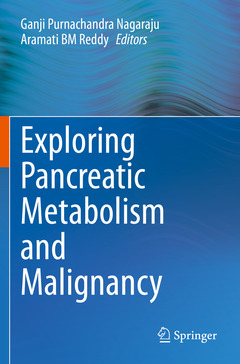Exploring Pancreatic Metabolism and Malignancy, 1st ed. 2019
Coordonnateurs : Nagaraju Ganji Purnachandra, BM Reddy Aramati

The book reviews the key biological mechanisms underlying the association between metabolic dysregulation, including obesity-associated enhancement of growth factor signaling, inflammation, and perturbation in pancreatic cancer cell growth and metastasis. It also illustrates the role of the inflammatory signaling pathway in metabolic diseases as well as tumor growth and explores the potential of these pathways as the rational targets for pancreatic cancer therapy.
Lastly, the bookoffers a comprehensive description of the challenges associated with diabetes and pancreatic cancer therapy.Chapter 1. Biology of pancreas and possible diseases.- Chapter 2. Pancreatitis: Clinical aspects of inflammatory phenotypes.- Chapter 3. Diabetes and Pancreatic Cancer – A Bidirectional Relationship Perspective.- Chapter 4. Metabolic Adaptations in Diabetes Mellitus and Cancer.- Chapter 5. Role of Mitochondria in pancreatic metabolism, diabetes and cancer.- Chapter 6. Targeting Mitochondrial Enzymes in Pancreatic Cancer.- Chapter 7. Diabetes with Pancreatic ductal adenocarcinoma.- Chapter 8. Role of Inflammatory Cytokines in the initiation and progression of Pancreatic Cancer.- Chapter 9. Perspectives and molecular understanding of pancreatic cancer stem cells.- Chapter 10. The Role of Hypoxia Inducible Factor-1α in Pancreatic Cancer and Diabetes Mellitus.- Chapter 11. Role of Heat shock protein 90 in Diabetes and Pancreatic Cancer Management.- Chapter 12. Insulin resistance is a common core tethered to diabetes and pancreatic cancerrisk.- Chapter 13. Immunotherapy for Diabetogenic Pancreatitis and Pancreatic Cancer: An Update.- Chapter 14. Exosomes: Mediators and Therapeutic Targets of Diabetes and Pancreatic Cancer.- Chapter 15. Methods and models in exploring pancreatic functions.
Dr. Aramati BM Reddy is an Assistant Professor at the School of Life Sciences, University of Hyderabad, India. He obtained his Master’s in Biotechnology from SV University, Tirupati-India and Ph.D. from L.V. Prasad Eye Institute, University of Hyderabad, India. He received postdoctoral training at the University of Pennsylvania and University of Texas Medical Branch-Galveston-TX in epigenetics, inflammation, and metabolic disorders. Dr. Reddy’s lab research interests focus on understanding cell signaling and gene regulation in the pathophysiology of metabolic malignancies and glaucoma. His lab is also working on understanding the role of several candidate genes and their significance for the outflow pathway of the aqueous humor of the anterior segment of the eye and glaucoma pathology. He has published 30 research papers in peer-rev
Date de parution : 12-2020
Ouvrage de 268 p.
15.5x23.5 cm



